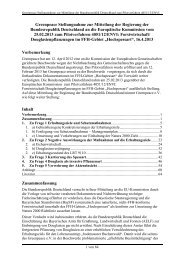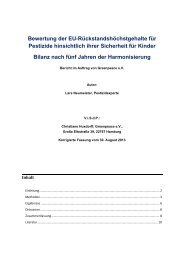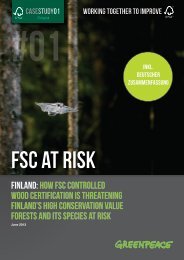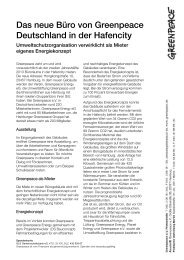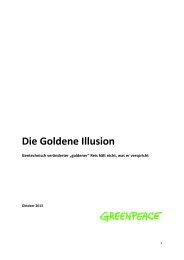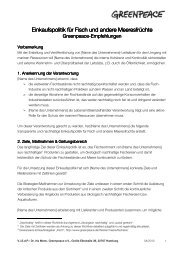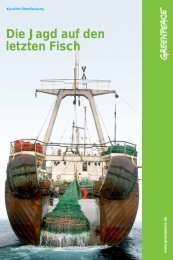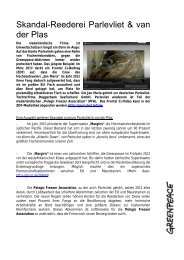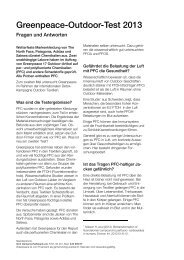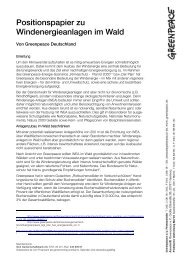Untitled - Greenpeace
Untitled - Greenpeace
Untitled - Greenpeace
You also want an ePaper? Increase the reach of your titles
YUMPU automatically turns print PDFs into web optimized ePapers that Google loves.
CARVING UP THE CONGO<br />
13<br />
THE BATTLE FOR THE DRC’S<br />
RESOURCES: WINNERS AND<br />
LOSERS<br />
Local people and the wildlife of the DRC have<br />
all suffered as a result of years of conflict in<br />
the battle for control over the country’s rich<br />
resources. With the end of war and democratic<br />
elections in the DRC, the international<br />
community now has a unique opportunity to<br />
ensure that this rainforest is conserved. This is<br />
important for the well-being of the<br />
communities whose way of life and future<br />
depend upon it, the region’s unique wildlife,<br />
and the sake of the global climate. Urgent<br />
action is needed to avoid replicating the<br />
failures of the past.<br />
In order to understand why the World Bankled<br />
reforms to the forestry sector in the DRC<br />
are an inappropriate development model for<br />
poverty alleviation, they must be seen<br />
against the background of the preceding<br />
decade of upheaval.<br />
Since 1996 with the overthrow of General<br />
Mobutu, continuing through nearly a decade of<br />
ferocious fighting and atrocities against the<br />
civilian population, and up to the country’s first<br />
multiparty democratic parliamentary elections<br />
at the end of 2006, the DRC has been a<br />
battleground in a fight for control of natural<br />
resources. 25<br />
At its height, at least seven foreign armies<br />
were involved in the war. For these forces –<br />
both foreign and Congolese – conflict was<br />
primarily an opportunity to loot the DRC’s<br />
resources. 26 ‘Corrupt and criminal elites’,<br />
backed by foreign multinationals, joined in the<br />
free-for-all for control of the natural wealth<br />
of the DRC. 27<br />
During the war, extensive logging titles were<br />
awarded. One incentive for this large-scale<br />
speculation was the price: until 2003, a<br />
200,000-hectare logging title cost only $286<br />
per year in forest area tax. 28 These low taxes<br />
encouraged companies to acquire titles to<br />
forest they were not in a position to exploit,<br />
hoping to sublease to other investors once<br />
economic and political stability was<br />
established. 29<br />
‘The danger posed by war<br />
to all of humanity and to our<br />
planet is at least matched<br />
by the climate crisis and<br />
global warming.’ 30<br />
UN Secretary General<br />
Ban Ki-moon, 2007<br />
©<strong>Greenpeace</strong>/Verbelen



